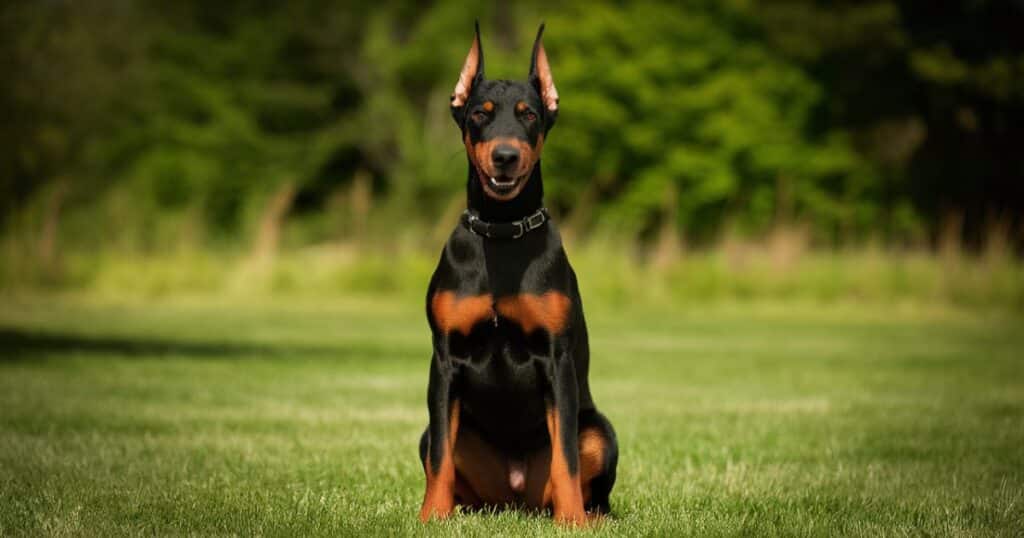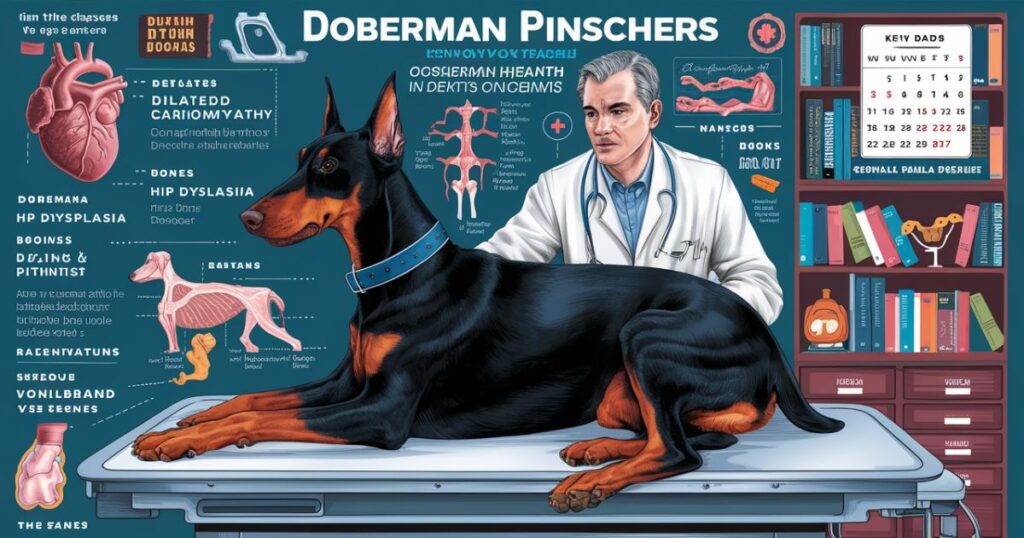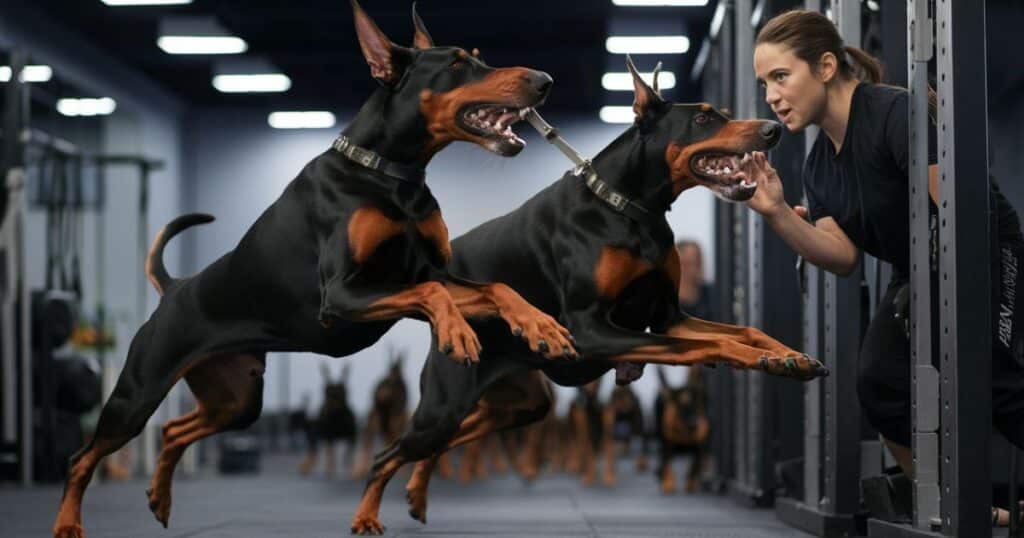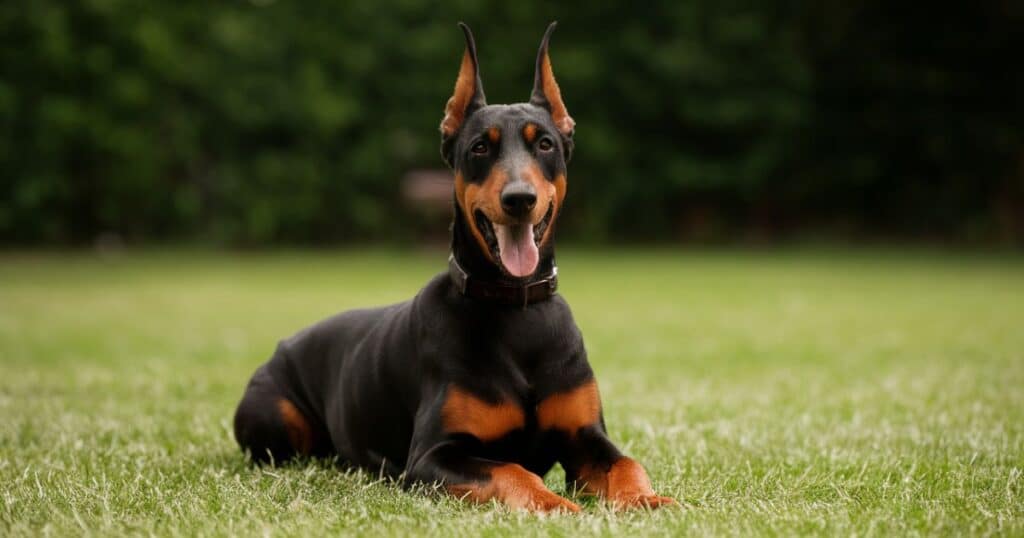As one of the most iconic dog breeds, the Doberman Pinscher commands attention with its sleek and muscular physique, coupled with a reputation for unwavering loyalty and exceptional guarding abilities. However, behind this striking appearance lies a multifaceted canine companion with a unique set of characteristics that potential owners should carefully consider.
In this comprehensive article, we’ll delve into the 12 most significant pros and cons of owning a Doberman Pinscher, shedding light on their temperament, needs, and suitability for various lifestyles.
Pros of a Doberman Pinscher
Intelligence and Trainability of a Doberman Pinscher

One of the standout advantages of the Doberman Pinscher is their remarkable intelligence and trainability. Ranked among the most intelligent dog breeds, Dobermans possess an eagerness to learn and excel in various tasks, making them highly receptive to obedience training and behavior training. Their ability to comprehend and retain commands efficiently allows them to thrive in diverse roles, from protection dogs and guard dogs to therapy dogs and competitive obedience disciplines.
Moreover, their inherent drive to please their owners and their strong focus make training sessions both rewarding and productive. With consistent comprehensive education and thorough instruction, these intelligent animals can master an extensive repertoire of commands and skills, showcasing their adaptability and versatility.
Loyalty and Protection
One of the most celebrated traits of the Doberman Pinscher is their unwavering loyalty and natural inclination towards protection. These dogs form deep bonds with their families and will go to great lengths to safeguard their loved ones, making them excellent guard dogs. Their imposing stature, coupled with their alertness and courage, creates a formidable presence that deters potential threats.
However, it’s essential to note that a Doberman’s protective instincts must be channeled through proper socialization and training from an early age. When raised and handled responsibly, these dogs become devoted loyal companions, fiercely protective of their families while remaining docile and well-mannered around familiar faces.
ALSO READ: The Ultimate Guide To Doberman Pinschers: Breed Characteristics, Care, And Training
Compatibility with Children of a Doberman Pinscher
Contrary to popular misconceptions, Doberman Pinschers can make exceptional family dogs and are often gentle and patient with children they have been raised alongside. Their loyalty and devotion extend to the entire household, and they tend to form strong bonds with the young members of the family.
That being said, it’s crucial to supervise interactions between Dobermans and children, particularly those outside the immediate family. Their protective nature may lead them to perceive unfamiliar children as potential threats, necessitating proper socialization and training to mitigate any risks.
Energy and Activity Level of a Doberman Pinscher
Dobermans are working dogs at heart, and as such, they possess an abundance of energy that necessitates regular physical activity and outdoor activities. These athletic and muscular canines thrive on exploration and excursions, making them excellent companions for active individuals or families who can provide ample opportunities for exercise and mental stimulation.
Failure to meet their exercise needs can lead to destructive behaviors, as pent-up energy may manifest in undesirable ways, such as excessive barking, chewing, or digging. Providing Dobermans with sufficient workout sessions, such as long walks, runs, or interactive games, is crucial to maintain their physical and mental well-being.
Versatility OF Doberman Pinschers

The Doberman Pinscher’s versatility is one of its most remarkable assets. Originally bred for personal protection and as a companion dog, these intelligent canines have proven their worth in various roles throughout history. From serving as protection dogs and guard dogs in military and law enforcement capacities to excelling in obedience training and competitive disciplines, Dobermans’ adaptability is truly impressive.
Moreover, their eagerness to work and please their owners has made them valuable assets in search and rescue operations, as well as therapy work, where their gentle and affectionate nature shines through. This versatility allows Doberman owners to explore diverse activities and pursuits with their furry companions, fostering a deeper bond and a sense of purpose.
Low Maintenance
Despite their impressive stature and striking appearance, Doberman Pinschers are relatively low-maintenance when it comes to grooming requirements. Their short, sleek coat requires minimal brushing and coat maintenance, making them an attractive choice for owners who prefer a more manageable grooming routine.
Additionally, Dobermans are moderate shedders, which can be an advantage for individuals with mild allergies. Regular nail trimming and occasional baths are typically sufficient to keep these dogs looking their best, allowing owners to focus their efforts on meeting their exercise and training needs.
Cons of a Doberman Pinscher
Health Concerns in Doberman Pinschers

Unfortunately, like many purebred dogs, Doberman Pinschers are prone to certain health concerns and genetic conditions that potential owners should be aware of. One of the most significant potential illnesses affecting the breed is dilated cardiomyopathy, a heart condition that can lead to heart failure if left untreated.
Other health issues that Dobermans may be predisposed to include von Willebrand’s disease (a blood clotting disorder), cervical vertebral instability (also known as Wobbler’s syndrome), and hypothyroidism. While responsible breeders strive to minimize these risks through genetic testing and selective breeding, owning a Doberman may require preparedness for potential medical issues and associated veterinary costs.
Behavioral Challenges of a Doberman Pinscher
While Dobermans are generally well-behaved and eager to please, they can exhibit certain behavioral challenges if not properly trained and socialized. One common issue is separation anxiety, which can manifest in destructive behaviors like excessive barking, chewing, or digging when left alone for extended periods.
Additionally, same-sex aggression is a concern within the breed, particularly among intact males. This territorial behavior can lead to conflicts with other dogs of the same sex if not addressed through early socialization and proper training techniques.
It’s crucial for Doberman owners to be prepared to invest significant time and effort into addressing these potential behavioral issues, as they can be challenging to manage if left unchecked.
Societal Perceptions and Living Conditions
Despite their reputation as loyal and affectionate companions, Doberman Pinschers often face unfair societal perceptions and stigmas regarding their perceived aggression. This perception can create challenges in certain living situations, such as rental properties or homeowners associations that may have breed restrictions or outright bans in place.
Moreover, Dobermans’ size and energy levels make them less suitable for small living spaces like apartments or condos, unless their owners can provide ample opportunities for exercise and mental stimulation outside the home. Their need for space and regular physical activity should be carefully considered, especially in urban or densely populated areas.
Exercise and Training Needs

As mentioned earlier, Doberman Pinschers have substantial exercise and training requirements that potential owners must be prepared to meet. These dogs require at least one to two hours of vigorous exercise daily, including activities such as running, hiking, or engaging in interactive games and training sessions.
Failure to provide sufficient physical and mental stimulation can lead to destructive behaviors, as pent-up energy and boredom can manifest in undesirable ways. Additionally, consistent obedience training and behavior training are essential to channel the Doberman’s intelligence and ensure a well-mannered companion.
Owners must be committed to dedicating the time and effort required to meet these demanding needs, as neglecting them can lead to behavioral issues and an overall unhappy dog.
Safety Considerations of a Doberman Pinscher
While Dobermans are generally good with children within their own families, their large size and protective instincts can potentially pose a risk to unfamiliar young children if not properly socialized and trained. Their powerful jaws and guarding tendencies mean that diligent supervision around children is essential, especially in situations involving unknown individuals.
Additionally, Dobermans’ imposing appearance and reputation as guard dogs may cause apprehension or fear in some individuals, leading to potential conflicts or misunderstandings. Proper socialization and training are crucial to mitigate these risks and ensure that Dobermans are well-behaved and respond appropriately to various situations.
Suitability for First-Time Owners
Due to their demanding exercise, training, and socialization needs, as well as their potential for behavioral challenges, Doberman Pinschers may not be the ideal breed for first-time dog owners. These dogs require an experienced and committed owner who can consistently meet their physical and mental needs while also providing comprehensive education and thorough instruction to address any behavioral issues that may arise.
First-time owners may find the Doberman’s high energy levels, strong-willed personality, and specific training requirements overwhelming, particularly if they are unprepared for the level of commitment required.
It’s generally recommended that first-time dog owners consider breeds with more moderate energy levels and less intensive training needs to gain experience before taking on the responsibility of a Doberman Pinscher.
Is a Doberman Pinscher the Right Dog for You?
After exploring the various pros and cons of owning a Doberman Pinscher, it’s essential to assess whether this breed aligns with your lifestyle, living situation, and experience level. Here are some key factors to consider:
- Activity Level: Dobermans require a significant amount of daily exercise and physical activity. If you lead an active lifestyle and have the time to dedicate to rigorous exercise routines, such as running, hiking, or engaging in interactive games, a Doberman may be a suitable companion. However, if you have a more sedentary lifestyle or live in a small space without access to ample outdoor areas, this breed may not be the best fit.
- Training Commitment: Dobermans are highly intelligent and require consistent, positive reinforcement training to channel their energy and abilities productively. If you are willing to invest the time and effort into obedience training, socialization, and addressing potential behavioral challenges, a Doberman could be a rewarding companion. However, if you are unwilling or unable to commit to the training demands, this breed may prove challenging to manage.
- Living Situation: Dobermans thrive in environments with ample space and may not be well-suited for small apartments or condos without access to outdoor areas. Additionally, be mindful of any breed restrictions or regulations in your area, as the Doberman’s reputation may lead to potential issues with housing or homeowners associations.
- Family Dynamics: If you have young children or plan to have children in the future, carefully consider the potential risks associated with a large, protective breed like the Doberman. While they can be excellent family dogs when properly socialized and trained, their size and guarding instincts necessitate diligent supervision around unfamiliar children.
- Experience Level: Dobermans are not typically recommended for first-time dog owners due to their demanding exercise, training, and socialization needs. If you are a novice owner, it may be advisable to gain experience with a more moderate breed before considering a Doberman.
By carefully evaluating these factors and weighing the pros and cons outlined in this article, you can make an informed decision about whether the Doberman Pinscher is the right breed for your unique circumstances and lifestyle.
Conclusion
The Doberman Pinscher is a remarkable breed that commands respect and admiration for its striking appearance, unwavering loyalty, and exceptional guarding abilities. However, behind this imposing exterior lies a complex and multifaceted companion with unique needs and challenges.
Throughout this comprehensive article, we’ve explored the key pros and cons of owning a Doberman, shedding light on their intelligence, trainability, loyalty, and protection capabilities, as well as their energy and versatility. We’ve also addressed the potential drawbacks, including health concerns, behavioral challenges, societal perceptions, and the demanding exercise and training requirements.
Ultimately, the decision to bring a Doberman Pinscher into your life should be carefully weighed against your lifestyle, living situation, and experience level. These dogs thrive in active households where their physical and mental needs can be consistently met, and their owners are committed to providing comprehensive education and thorough instruction.
For those willing to dedicate the time and effort required, a Doberman can be an incredibly rewarding companion, offering faithfulness, devotion, and allegiance like no other breed. However, for those unable to meet the demands of this breed, exploring alternative options may be more suitable.
Regardless of your decision, it’s crucial to prioritize responsible pet ownership and ensure that any dog you welcome into your life receives the care, attention, and enrichment they deserve. By making an informed choice and committing to a lifelong partnership, you can unlock the true potential of this remarkable breed and foster a deep, lasting bond with your loyal and energetic Doberman Pinscher.
ALSO READ THIS POST: How Much Does The Farmer’s Dog Food Cost In 2024? An In-Depth Look
FAQ’s
What is the downside of a Doberman?
Potential downsides of owning a Doberman include demanding exercise/training needs, health issues like dilated cardiomyopathy, and societal stigma due to their imposing appearance and protective nature.
What should you know before getting a Doberman?
Before getting a Doberman, understand their high energy levels, exercise demands, training requirements, potential for separation anxiety/same-sex aggression, and the commitment needed to properly socialize and care for this breed.
Is owning a Doberman hard?
Yes, owning a Doberman can be challenging, especially for first-time owners, due to their intense exercise needs, strong-willed personalities, and specialized training/socialization requirements to manage potential behavioral issues.
What is a Doberman weakness?
A major weakness of Dobermans is their susceptibility to certain health conditions like dilated cardiomyopathy, von Willebrand’s disease, and cervical vertebral instability (Wobbler’s syndrome), which can be costly to manage.
Do Dobermans like to cuddle?
While Dobermans are affectionate and loyal to their families, they may not be overly cuddly due to their high energy levels and need for physical activity. However, proper training can encourage a calmer demeanor for cuddle time.
Do Dobermans have a bad reputation?
Yes, Dobermans often face an unfair reputation for being aggressive or dangerous dogs, largely due to their imposing appearance and history as protection dogs. Proper socialization is key to countering this stigma.

Davin Connor is an experienced author with 3 years in pets writing. Known for concise, informative content, he shares expertise on pet care, behavior, and health through his engaging articles.






